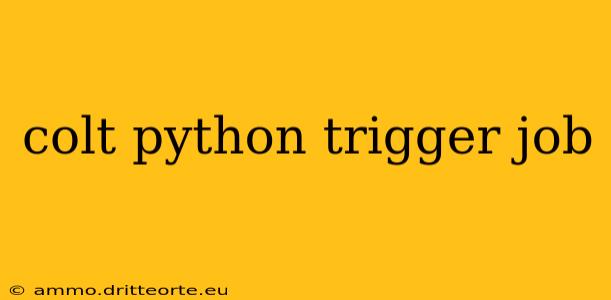The Colt Python, a legendary revolver renowned for its accuracy and smooth action, can be further refined with a trigger job. A well-executed trigger job significantly improves the gun's shootability, making it more accurate and enjoyable to shoot. This isn't about making the trigger pull incredibly light; it's about achieving a crisp, clean break with minimal creep and overtravel. This guide explores the intricacies of a Colt Python trigger job, highlighting key considerations and potential pitfalls. Note: This information is for educational purposes only. Modifying firearms requires specialized tools, skills, and a thorough understanding of gunsmithing principles. Always prioritize safety and consult with a qualified gunsmith if you're unsure about any aspect of this process.
Understanding the Colt Python Trigger Mechanism
Before diving into the specifics of a trigger job, it's crucial to understand the Python's trigger mechanism. This double-action/single-action revolver uses a complex interaction of parts: the trigger, sear, hammer, and various springs. Improper adjustment can lead to malfunctions or even dangerous conditions.
Key Components and Their Roles:
- Trigger: The component you directly interact with. A trigger job focuses on refining its movement and feel.
- Sear: Engages with the hammer, holding it in the cocked position. Proper sear engagement is critical for safety and reliable function.
- Hammer: Strikes the firing pin, igniting the cartridge. The hammer's interaction with the sear is meticulously tuned during a trigger job.
- Springs: Maintain tension and control the movement of various components. Spring tension adjustments are key to achieving a desired trigger pull weight and feel.
The Trigger Job Process: A High-Level Overview
A Colt Python trigger job typically involves several steps:
1. Disassembly and Inspection:
Carefully disassemble the revolver, following a detailed guide specific to the Colt Python. Inspect each component for wear, damage, or irregularities. This is crucial for identifying potential issues that may affect the trigger job's outcome.
2. Trigger Polishing and Surface Treatment:
Smooth out any rough surfaces on the trigger, sear, and hammer engagement points using fine polishing compounds. This reduces friction and improves the trigger's feel. Be careful not to remove excessive material.
3. Spring Adjustment:
Adjusting the mainspring and trigger return spring tension is a critical step. Reducing mainspring tension lightens the trigger pull, but too much reduction can compromise reliability and ignition. Similarly, adjusting the trigger return spring affects the trigger's reset.
4. Sear Engagement Adjustment:
Carefully adjust the sear engagement to ensure a clean break without creep. This is a delicate process requiring precision and attention to detail. Improper adjustment can lead to misfires or dangerous conditions.
5. Overtravel Adjustment:
Reduce overtravel (the distance the trigger travels after the shot breaks) for a more precise and controlled trigger feel. This often involves carefully stoning or polishing the trigger's contact points.
Potential Challenges and Considerations
Performing a trigger job on a Colt Python requires advanced gunsmithing skills. Common challenges include:
- Proper Tooling: Specialized tools are necessary for accurate adjustments and preventing damage to delicate components.
- Precision and Patience: The process is intricate, demanding patience and meticulous attention to detail.
- Safety: Prioritizing safety throughout the process is paramount. Improper modifications can render the firearm unsafe.
- Understanding the Recoil System: Modifying the trigger mechanisms can subtly affect the overall recoil management, potentially increasing felt recoil if not done precisely.
Conclusion: Seek Professional Expertise
While a Colt Python trigger job can significantly enhance shooting experience, it's a complex undertaking best left to experienced gunsmiths. The risks of improper modification outweigh the potential benefits for most individuals. A professional gunsmith possesses the necessary skills, tools, and knowledge to perform a safe and effective trigger job, ensuring your Colt Python remains reliable and safe to shoot. Investing in professional service protects your investment and ensures years of safe and enjoyable shooting.

